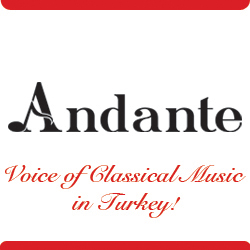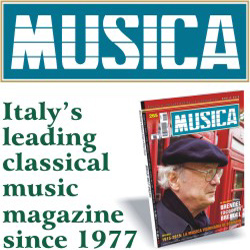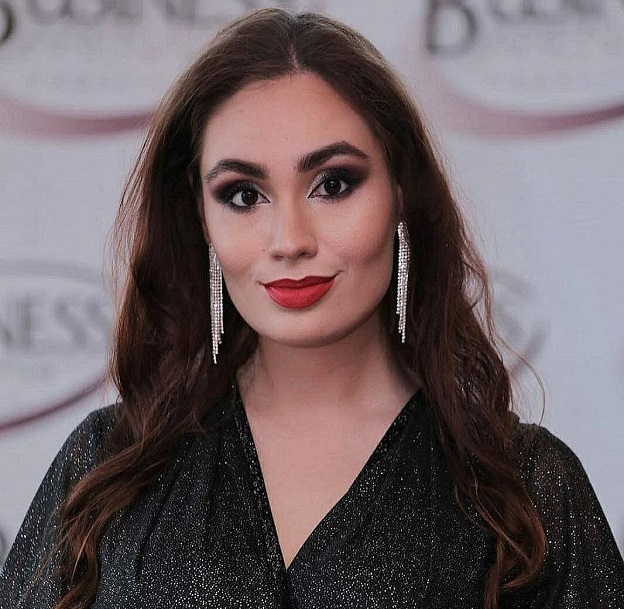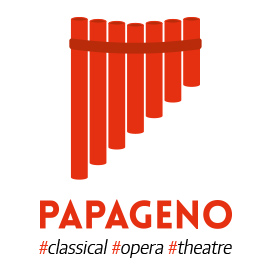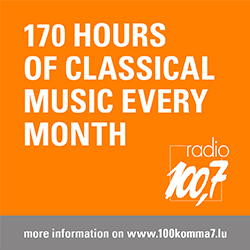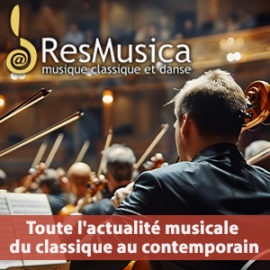Romanian soprano Aida Pascu was named Young Artist of the Year 2024 of the International Classical Music Awards (ICMA). The 24-year-old singer answers the questions of Irina Vasilescu, a Senior Producer of ICMA Jury member Radio Romania Muzical.
Aida Pascu was born and raised in a musical family, both her parents being opera singers. She was part of the Children’s Choir of the National Bucharest Opera and she studied classical singing at the Bucharest Music University with tenor Ionel Voineag. The soprano also participated in masterclasses given by renowned artists, such as Nelly Miricioiu and Raina Kabaivanska. Aida Pascu has a special relationship with the famous Bulgarian soprano, who has become her mentor. The young soprano has won numerous prizes at national and international competitions (more competitions to come, she says) and she already appeared, with great success, in different opera productions (Maggio Musicale Fiorentino, Bucharest National Opera, Cluj-Napoca National Opera, Sofia Opera House).
Our interview took place in Bucharest, with Aida visiting from Modena, the Italian city she currently lives and studies.
Aida Pascu, you were named Young Artist of the Year 2024 by the International Classical Music Awards jury. How did you receive the news?
It was the 18th of January and I remember being very surprised by the reaction of the people, especially in Romania. Everyone was stunned, everyone was so supportive and I got so many compliments on this award that I received and I was obviously very, very happy.
You were born into a musical family, both of your parents are opera singers. I was wondering whether the choice of becoming a musician yourself was a natural one or was it something that you felt pressured into?
I was never pressured into this. Yet for me singing was the most natural thing ever. I like to joke around saying that I started singing even before I started speaking, which is true, actually. And I have recordings of myself when I was two years old singing all over the place. I remember when I was five, I first sang ‘Un bel di vedremo’.
Already?
Yes. At a kindergarten party or something like that. And so to me, it was very, very natural and I always behaved well when I went to the Opera. I was passionate about opera in general and music. It just spoke to me ever since I was born. I loved dancing around the house on classical music, of course. And I still love doing that before entering a show. I remember doing Don Giovanni in January and I was just dancing around on the overture. And I used to play with my toys and they were playing roles in operas, especially Madama Butterfly. I was obsessed with Madama Butterfly.
You still are?
Oh, well, it’s definitely a role I’m looking forward to debut.
Earlier today, we were talking about Ermonela Jaho, another ICMA prize winner (at a different category). She’s one of the greatest interpreters of Madama Butterfly nowadays.
I admire her very, very much for everything she does.
Are there any other singers that you feel connected to?
I’m more connected to Renata Scotto, obviously a singer from the past, and Mirella Freni. I feel very connected to them because I studied in Italy and I have the Italian singing technique. And the roles they’ve done, they are very close to my repertoire. And obviously I learned the thing that Italians call declamato and Renata Scotto used to do it very, very much, especially in Madama Butterfly. And there is this one recording of her that I appreciate, let’s say the most. And also in La Traviata, I love her very much.
You were giving your first performance in public with kindergarten colleagues at five. Was that a good experience for you?
It was. It definitely was. I wasn’t aware that I had to hold a microphone myself, so I had someone hold it for me the entire time. And also I genuinely said that I was going to sing the aria Un bel di vedremo from Madama Butterfly.
Do you suffer from stage fright?
I was pretty afraid, I would say. Because once you know you have a value at some point, you’re more confident. But until you get there… I’m not going to lie, I suffered from imposter syndrome. I was around 20, 21 years old, I was just starting to learn how to do things right. And I’ve had this experience, I was singing for the first time at the Romanian Athenaeum in Bucharest and I remember going on stage and thinking, Wow, this is so beautiful, but what am I doing here? So, of course, I wasn’t very, very confident. I am still working on this and I do suffer from stage fright in auditions and competitions. But if I have to go on stage and sing an entire role or even a concert, I manage to feel more confident and to feel like I have to express something with my music. So, no, there is no place for stage fright right now.
Do you still think you’ll be going to competitions in the near future?
I definitely should. I still haven’t chosen the competitions because I have some contracts in the next few months. But after these, if nothing else appears in the meantime, I should also do some competitions.
Could you let us know a bit of what’s coming next? You mentioned these contracts.
Yes. So, for instance, there is this concert in Valencia, at the Palau de la Musica. This one is going to be on April 12th, the ICMA gala concert.
A gorgeous hall.
Yes. And I will be singing the aria Ernani, involami from Ernani by Giuseppe Verdi. It was an aria of my choice. But it was my dream to sing this aria ever since I got to Italy and started studying it, which was two years ago. And then another important contract that I already signed is going to last from September to November with the rehearsal period included. And it is going to be the role of Elcia in a less known opera, Mosè in Egitto by Rossini.
Coming back to your beginnings, when did you first start practicing with someone? And I assume that someone was, first of all, your mother and probably your father, too – soprano Madeleine Pascu and baritone Ionuț Pascu.
Yes, that is true.
How was that? Because sometimes the chemistry between a parent and his child can be difficult. How was it in your case?
When I started singing and practicing with my mother, she knew how to put things for me. It was mostly, I wouldn’t say, a joke, because I don’t want to sound like it wasn’t serious. But it was definitely through playing. I was playing and that made things much easier for me.
How old were you?
I remember practicing, really practicing, ever since I was nine. I sang, for example, Addio del passato with a small orchestra when I was nine.
Where was that?
At the Law University in Bucharest. Very interesting. And so I had to sing as good as I could do that performance. So I had to study a bit. And that’s when I started, because I was in the children’s choir of the Bucharest National Opera for so long (since I was eight years old until around 20 years old). So practicing was at the beginning a playful, cheerful activity. But then things got more serious and I started understanding things about vocal technique. And my relationship with my parents was never something to stand between me and the act of learning, actually. Because when we were there studying together, we weren’t a mother and daughter. That wasn’t our relationship.
You assumed the roles of teacher and student.
My parents also had students of their own and I was there attending each and every lesson. So I was very used to this type of knowledge, this type of activity, and I was enjoying it. I was always very curious about everything in general.
I remember the first time I heard you sing, it was actually at your parents’ house in a wonderful, big space, especially designed for recitals. And you were there singing along with other colleagues of yours from the class that your parents were giving. It was very moving,
And I was 15. And my parents let me sing things that are more difficult. Let’s say I remember myself singing the duet from Madama Butterfly, the one with the mezzo-soprano, with Suzuki. And well, usually if you say, well, there’s a 15 year old singing this, people would go crazy. Why would you let her do that? But like I said, it was very natural to me. And also my voice would allow it, although I wasn’t obviously technically perfect or anything. And I’m still not technically perfect. But anyway, my parents did let me sing more difficult things. And this pushed me in the best way possible. This pushed me to improve my vocal qualities and to become a better singer over time.
Who was your first official professor outside the family?
Outside the family, when I went to the conservatory, I had the amazing pleasure and the honor to study with Maestro Ionel Voineag, who was a very, very important Romanian tenor. And I still hold him close to my heart.
Do you still consult with him?
Well, we keep in touch. And I’m very happy whenever he has the time to send me something and to tell me, look, you should sing this. You should do that role. Here’s an example. And yes, if I sometimes have a question, I know I can discuss it with him.
Raina Kabaivanska is another big name that you were studying with, still studying with. When and where did your collaboration begin?
I was in Sofia in 2021. And I knew she had her masterclass there. There was a one-month masterclass. And it was in September. I went there to audition because you can’t get in without auditioning. And I was very surprised to see that I was chosen for that masterclass. My name was first on the list. And this was the opportunity that later just opened every door for me. She saw my potential. And she gave me the scholarship. And that is how I ended up in Modena for two consecutive years, studying with her and attending her masterclass for one year.
Modena, a city which is so well connected to opera – it is the city of Pavarotti, the city of Mirella Freni. What’s the atmosphere like?
Right now, it’s not necessarily a very musical city. Of course, they have the Pavarotti-Freni Theater, where I had the pleasure to sing and where I will perform. There is the statue of Pavarotti right in front of the theater. There is his house. One of his houses is a bit close to Modena, let’s say. And people go there because it’s the Pavarotti Museum. And yes, it is definitely connected. And people know about this. But let’s say it’s not very, very musical. It’s no different than other Italian cities. But the things I learned in Italy, I know I could never learn them anywhere else.
I’ve been talking to a lot of conductors and opera singers recently and all of them told me young musicians nowadays, either conductors or singers, they are all aiming to have instant success. They are not really willing to put in the work, for years. This is obviously not your case. But do you feel this in some of your colleagues?
This is a more complicated question because people, usually young artists, usually want this instant gratification. Because we do live in a fast-paced world and there is another issue: we need the money. We need the money to survive. We need to start doing things and usually a big career is associated with a bigger income. We need to put the money into auditions and competitions and everything. It’s a real thing and it’s also a bit about the fact that we live in a world that’s very driven by social media.
So we see someone who has success and we might feel like a failure if we don’t have that kind of big success. And it’s not about the work. We all put in the work and the effort to some extent, but well, we would like to feel admired. We would like to feel, but this is not what art is about. This, I think, is a trap for young artists. And actually what I’ve observed, because I also had the pleasure to speak with people who have big careers, especially in Italy, they didn’t want this. They didn’t want the big careers. That’s the irony now, actually, it’s what happened to them because they were just working and that was it.
And they were passionate about what they were doing.
Exactly. So I don’t think we have to chase fame. And I don’t want fame myself. I really don’t. But if it comes, well, it is welcome. It’s a beautiful thing. But if you have fame, you need it in order to send a message to the public, in order to say something with your art. I think that is the good side of fame. I love famous people, famous artists in our world. They are very, very valuable and I do admire them very much. But it’s a trap for the young good generation.
This is an aspect not many people talk about – the financial s. So thank you for putting things into context. When it comes to emotional support – can you count on Maestra Kabaivanska as well?
Raina Kabaivanska was definitely my rock these years. And I was also very, very lonely in Modena, living alone. And I was in a, let’s say, tormented period of my life. I was losing friends. I was losing people that I loved. In many ways. And we all suffer from anxiety and sometimes depression. And we just have to stay strong and fight these thoughts and appreciate ourselves for having the health to do these things, for having a body which supports us. It’s not about the positive mentality trend. It’s just about the real things we have to be grateful for every day. And we have to be our own rock most of the time, because this is a very lonely world, even though you interact with people while you’re doing a contract. You go home and you’re alone most of the time. Even if you’re married, you have a family. You’re alone. You’re on your own.
And most of the times you also suffer from insomnia, from what I’ve heard; because that huge rush of adrenaline that you get during the performances doesn’t just go away after you finish. Are you prepared for such a life?
Yes. This is definitely my path. And I’m ready because I used these two years in Modena as a training period for my future life. I’m not saying it’s easy or it gets easier with time, but you just have to find hobbies that you like. I don’t know, drawing, going to the gym, doing things to fill that time when you’re not there rehearsing and you’re alone, just alone. And you have to be prepared for this. And if you have a family that supports you, if you have friends who support you, even though it’s a text message, they’re there. You know they’re there for you. And that is important. It’s important to have a few good connections.
What are the roles that you sang so far and what are you preparing?
I made my debut with Mimi from La Bohème. And I already sang it in three different productions. I then had my debut with Donna Anna from Don Giovanni. And I also sang Nedda from Pagliacci, which is one of my favorites so far. I have studied Liu from Turandot. I absolutely love and I am studying Tatiana from Eugen Onegin. It’s a role that I love with all my heart. And I have studied Fiordiligi from Cosi fan tutte at the university along with Contessa from Le Nozze di Figaro. And I am feeling ambitious: Micaela from Carmen. And if I want to feel ambitious, which I have to, I am studying Violetta from La Traviata. It is a dream role for many sopranos. Let’s say it’s not necessarily 100% my vocal type.
How do you envision your career in developing?
Right now I am studying and singing roles that are for soprano lirico and lirico spinto. I feel like my voice is a lirico spinto right now. And people have told me to stay on this repertoire as much as I can. My love for on stage drama is something I would say, genetically at this point, because my parents are, well, a drama queen and king with their repertoire.
Just on stage, I hope.
Well, yes, just on stage. But I grew up watching these operas. Everybody got killed, everybody died, and everybody suffered. And this is what speaks the most to me. I feel much moved by these dramatic, tragic things. Since I love this repertoire, I’m definitely going that way.
Right now, I just try to be calm, not take any offer that I’m being given right now.
You don’t feel prepared for it.
Yes. Well, it’s not that I couldn’t physically do it. I could. But I’m not sure it’s safe 100% safe for me, for my voice, to just push it that far. Because we’re talking about a longer period of rehearsals. We’re talking about, you know, things that make me push a bit, push my body a bit. And that I don’t want. We have to evolve. We have to push ourselves, our limits, of course, but gently, step by step.


